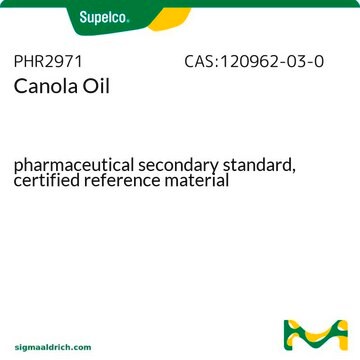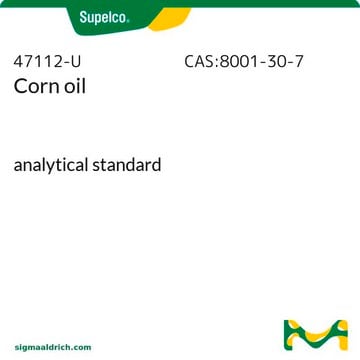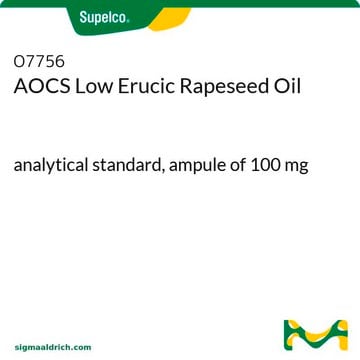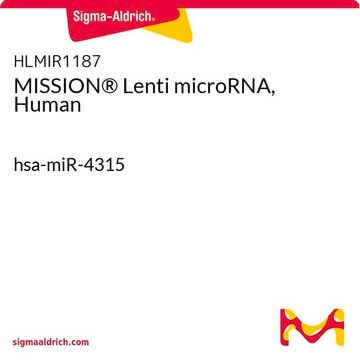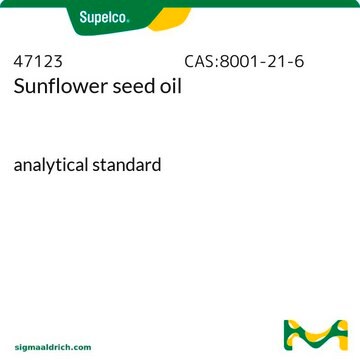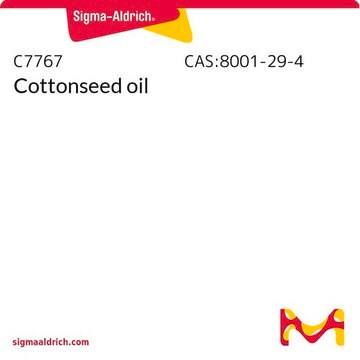W530228
Canola oil
Certified organic (NOP)
Synonym(s):
Rapeseed oil
Sign Into View Organizational & Contract Pricing
All Photos(1)
About This Item
grade:
Certified organic (NOP)
Halal
Kosher
Halal
Kosher
food allergen:
no known allergens
Recommended Products
grade
Certified organic (NOP)
Halal
Kosher
Quality Level
origin
Switzerland origin
refractive index
n20/D 1.473
application(s)
flavors and fragrances
Documentation
see Safety & Documentation for available documents
food allergen
no known allergens
Organoleptic
faint
Looking for similar products? Visit Product Comparison Guide
General description
Canola oil, a widely used vegetable oil, is obtained from canola seeds. It contains low levels of erucic acid and glucosinolates when compared to crude rapeseed oil. Canola oil is generally composed of high amounts of monounsaturated fatty acids, polyunsaturated fatty acids and low level of saturated fatty acids. It may also contain phytosterols and vitamin E.
Legal Information
Certified organic by MOSA
Storage Class Code
12 - Non Combustible Liquids
WGK
WGK 3
Flash Point(F)
Not applicable
Flash Point(C)
Not applicable
Personal Protective Equipment
dust mask type N95 (US), Eyeshields, Gloves
Choose from one of the most recent versions:
Already Own This Product?
Find documentation for the products that you have recently purchased in the Document Library.
Canola: Chemistry, Production, Processing, and Utilization, 245-247 (2015)
Ask the doctor. I use a lot of canola oil in cooking, because it's heart-healthy. My husband has prostate cancer, and I just heard that canola oil might make it worse. Is that really true and should I stop using it for cooking?
Anthony L Komaroff
Harvard health letter, 37(11), 2-2 (2012-10-19)
Laziz Bouzidi et al.
Food & function, 4(1), 130-143 (2012-10-17)
Pure saturated triacylglycerols (TAGs) in canola oil were used as model systems to analyse oil loss in structured oil both from thermodynamic and kinetic perspectives. Two important parameters which effectively and predictively measure the relative propensity of a solid network
Cengizhan Yigitler et al.
Clinics (Sao Paulo, Brazil), 67(11), 1303-1308 (2012-11-28)
Postsurgical abdominal adhesions are common, serious postoperative complications. The present study compared the usefulness of 4% icodextrin and canola oil in preventing postoperative peritoneal adhesions. Twenty-four Wistar albino rats were divided into three groups. Following a laparotomy, a serosal abrasion
Jiang Jiang et al.
Meat science, 93(3), 469-476 (2013-01-01)
Alkali (pH(12)) and acid (pH(1.5)) pH-treated soy protein isolates (SPI) were incorporated (0.25-0.75% protein) into sols of myofibrillar protein (MP, 3%, in 0.6 M NaCl at pH 6.25) with or without 0.1% microbial transglutaminase (TG) to investigate the potential as
Our team of scientists has experience in all areas of research including Life Science, Material Science, Chemical Synthesis, Chromatography, Analytical and many others.
Contact Technical Service
